|
Books Should Be Free Loyal Books Free Public Domain Audiobooks & eBook Downloads |
|
|
Books Should Be Free Loyal Books Free Public Domain Audiobooks & eBook Downloads |
|
Fiction |
|---|
|
Book type:
Sort by:
View by:
|
By: Louisa May Alcott (1832-1888) | |
|---|---|
 A Garland For Girls
A Garland For Girls
“These stories were written for my own amusement during a period of enforced seclusion. The flowers which were my solace and pleasure suggested titles for the tales and gave an interest to the work. If my girls find a little beauty or sunshine in these common blossoms, their old friend will not have made her Garland in vain.” – L.M. Alcott, September, 1887 | |
 Rose in Bloom
Rose in Bloom
Opening several years after the close of "Eight Cousins", we find Rose coming home fresh from a voyage overseas, to find much changed about her. Now of a marriageable age and heiress to a fortune, Rose finds joy,sorrow, and finally love await her -- as the Rose is finally ready to bloom into a good, strong, sweet and true woman.This sequel to Eight Cousins was written by Louisa May Alcott, the author of many well beloved children's books including Little Women, An Old Fashioned Girl, Under the Lilacs and more. | |
 Under the Lilacs
Under the Lilacs
"When two young girls decide to have a tea party with their dolls and a mysterious dog comes and eats their prized cake, they end up finding a circus run-away, Ben Brown. Ben is a horse master, and loves horses, so when the Moss' take the young boy in, they decide to give him work at the neighbors house driving cows (on a horse, of course). After that a series of events happens, and Ben finds out his beloved father is dead. Miss Celia, a neighbor, feels sorry and comforts him, and finally offers to let Ben stay with her and her fourteen-year-old brother, Thornton who is called Thorny... | |
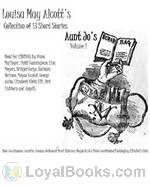 Aunt Jo's Scrapbag
Aunt Jo's Scrapbag
A collection of short stories by Louisa May Alcott that were written with the intent to entertain the whole family and to fill children's heads with wonder and delight. | |
 Work: A Story of Experience
Work: A Story of Experience
It is one of “several nineteenth-century novels [which] uncovers the changes in women’s work in the new industrial era, as well as the dilemmas, tensions, and the meaning of that work” The story depicts the struggles of a young woman trying to support herself. The main character, Christie Devon, works outside the home in a variety of different jobs, but the end of her story marks “the beginning of a new career as a voice and activist for other working women”. | |
 Flower Fables
Flower Fables
Flower Fables is Louisa May Alcott’s first book, penned at 16 for Ralph Waldo Emerson’s daughter, Ellen. | |
 The Mysterious Key and What It Opened
The Mysterious Key and What It Opened
In this delightful short story, we discover the secrets of the Trevlyn family. 'The Mysterious Key and What it Opened' is a mystery entwined with romance (Introduction by ashleighjane) | |
 Behind a Mask, or a Woman's Power
Behind a Mask, or a Woman's Power
Fans of Louisa May Alcott's Little Women will remember that her heroine Jo wrote racy novels before turning her hand to more "serious" literature. Alcott, writing under the pseudonym A. M. Barnard, often did the same, and Behind a Mask (1866) is one of her sensation novels. It focuses on Jean Muir, who enters the home of the wealthy Coventry family as governess to their sixteen-year-old daughter. But is the beguiling Miss Muir all that she seems to be? (Introduction by Elizabeth Klett) | |
 Shawl-Straps: A Second Series of Aunt Jo's Scrap-Bag
Shawl-Straps: A Second Series of Aunt Jo's Scrap-Bag
| |
 Spinning-Wheel Stories
Spinning-Wheel Stories
A group of stories-within-a-story, told in the classic Louisa May Alcott style. "I've a little cold," said the old lady, "and am too hoarse for talking, my dears; but Aunt Elinor has looked up a parcel of old tales that I've told her at different times and which she has written down. You will like to hear her reading better than my dull way of telling them, and I can help Minnie and Lotty with their work, for I see they are bent on learning to spin." The young folk were well pleased with grandma's proposal; for Aunt Nell was a favorite with all, being lively and kind and fond of children, and the only maiden aunt in the family... | |
By: Alan Edward Nourse (1928-1992) | |
|---|---|
 Five Stories by Alan Nourse
Five Stories by Alan Nourse
These Five Stories were written by Alan Edward Nourse, an American science fiction (SF) author and physician. He wrote both juvenile and adult science fiction, as well as nonfiction works about medicine and science. His SF works generally focused on medicine and/or psionics. Psionics refers to the practice, study, or psychic ability of using the mind to induce paranormal phenomena. Examples of this include telepathy, telekinesis, and other workings of the outside world through the psyche. | |
By: Victor Hugo (1802-1885) | |
|---|---|
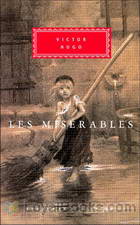 Les Misérables
Les Misérables
Victor Hugo's Les Misérables is a novel which tells the story of ex-convict Jean Valjean, his struggles and eventual redemption. It's hailed by many critics as not just Victor Hugo's finest work but also one of the best French novels of all time. Like most epic novels written in the 19th century, the storyline of Les Misérables spans through several decades beginning in the early 1800s and culminating in the 1832 June Rebellion in Paris. The events related to the lives of the central characters in the novel are also tied to the great historical events of the time from the French Revolution to the June Rebellion... | |
 Toilers of the Sea
Toilers of the Sea
This is the story of a man’s monumental struggle against nature, to win the hand of the woman he loves, and surmount every difficulty that Nature puts in his path | |
 The Man Who Laughs
The Man Who Laughs
The Man Who Laughs is a novel by Victor Hugo, originally published in April 1869 under the French title L'Homme qui rit. Also published under the title "By Order of the King". (Introduction by Wikipedia) | |
By: P. G. Wodehouse (1881-1975) | |
|---|---|
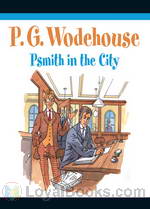 Psmith in the City
Psmith in the City
Mike’s dream of studying and playing cricket at Cambridge are thwarted as his father runs into financial difficulties. Instead, Mike takes on the job of clerk at the “New Asiatic Bank.” Luckily, school friend Psmith, with his boundless optimism and original views, soon joins his department, and together they endeavour to make the best of their new life in London. | |
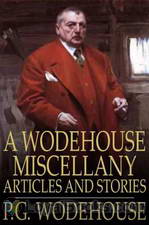 A Wodehouse Miscellany; Articles and Stories
A Wodehouse Miscellany; Articles and Stories
Sir Pelham Grenville Wodehouse was an English comic writer who enjoyed enormous popular success for more than seventy years. Best known today for the Jeeves and Blanding Castle novels and short stories, Wodehouse was also a talented playwright and lyricist who was part author and writer of fifteen plays and of 250 lyrics for some thirty musical comedies. | |
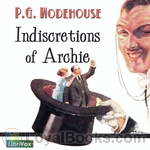 Indiscretions of Archie
Indiscretions of Archie
It wasn’t Archie’s fault really. It’s true he went to America and fell in love with Lucille, the daughter of a millionaire hotel proprietor and if he did marry her–well, what else was there to do?From his point of view, the whole thing was a thoroughly good egg; but Mr. Brewster, his father-in-law, thought differently, Archie had neither money nor occupation, which was distasteful in the eyes of the industrious Mr. Brewster; but the real bar was the fact that he had once adversely criticised one of his hotels... | |
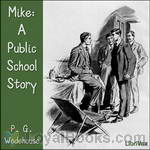 Mike: A Public School Story
Mike: A Public School Story
This novel introduces the characters Mike Jackson and Psmith, who are featured in several of Wodehouse’s later works. It shows how the two characters first met each other as teenagers at boarding school. As Psmith doesn’t appear until about halfway through this book, it was later released as two separate books, Mike at Wrykyn and Mike and Psmith. There’s lots of cricket, but you don’t need to understand the game to enjoy the antics of these public school boys as they "rag" each other and the authorities. | |
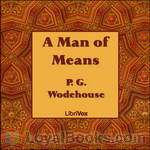 A Man of Means
A Man of Means
A Man of Means is a collection of six short stories written in collaboration by P. G. Wodehouse and C. H. Bovill. The stories all star Roland Bleke, a nondescript young man to whom financial success comes through a series of “lucky” chances, the first from a win in a sweepstake he had forgotten entering. Roland, like many a timid young man seeks love and marriage. In this pursuit his wealth is regularly a mixed blessing. The plot of each story follows its predecessor, sometimes directly, and occasionally refer back to past events in Bleke’s meteoric career... | |
 Selected Short Stories
Selected Short Stories
"A miscellaneous collection of short stories, not featuring any of Wodehouse's regular characters, most concern love and romance and, being Wodehouse, all are amusing." | |
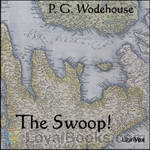 The Swoop!
The Swoop!
The Swoop! tells of the simultaneous invasion of England by several armies — “England was not merely beneath the heel of the invader. It was beneath the heels of nine invaders. There was barely standing-room.” (ch. 1) — and features references to many well-known figures of the day, among them the politician Herbert Gladstone, novelist Edgar Wallace, actor-managers Seymour Hicks and George Edwardes, and boxer Bob Fitzsimmons. | |
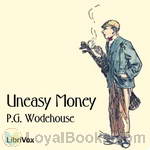 Uneasy Money
Uneasy Money
Uneasy Money is a romantic comedy by P.G. Wodehouse, published during the First World War, it offers light escapism. More romantic but only a little less humorous that his mature works, it tells of the vicissitudes of poor Lord Dawlish, who inherits five million dollars, but becomes a serially disappointed groom. When the story opens Bill (Lord Dawlish, a thoroughly pleasant man) is engaged to a demanding actress. His first thought when hearing of his massive legacy from a stranger whose tendency to slice he once cured on a West Country golf course is of the disappointed relatives... | |
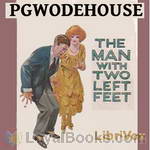 The Man With Two Left Feet, and Other Stories
The Man With Two Left Feet, and Other Stories
The Man With Two Left Feet, and Other Stories is a collection of short stories by P. G. Wodehouse, first published in the United Kingdom on March 8, 1917 by Methuen & Co., London, and in the United States in 1933 by A.L. Burt and Co., New York. All the stories had previously appeared in periodicals, usually the Strand in the UK and the Red Book magazine or the Saturday Evening Post in the US. It is a fairly miscellaneous collection — most of the stories concern relationships, sports and household... | |
 Not George Washington
Not George Washington
It has been said that behind every successful man is a good woman. This is certainly true in the case of James Orlebar Cloyster. However, some funny things happened on his road to success. His story is humorously told from the point of view of several parties involved.According to Wikipedia, the book is a humorous, fictionalized account of Wodehouse's early years as a journalist, with Wodehouse being portrayed by the character of Cloyster. | |
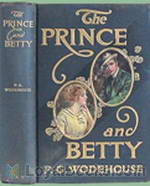 The Prince and Betty
The Prince and Betty
The Prince and Betty is a novel by P. G. Wodehouse. It was originally published in Ainslee's Magazine in the United States in January 1912, and, in a slightly different form, as a serial in Strand Magazine in the United Kingdom between February and April 1912, before being published in book form, in the UK only, by Mills & Boon, London, on 1 May that year. A substantially different version, which incorporated the plot of Psmith, Journalist, was published in the US by W. J. Watt, New York on 14 February 1912, and is the only version now widely available... | |
 Psmith, Journalist
Psmith, Journalist
Psmith takes over editing a paper while the usual editor is away on vacation. He takes on a local slum lord, and divers alarums ensue. (description by Psuke Bariah) | |
 Their Mutual Child
Their Mutual Child
Their Mutual Child (aka The Coming of Bill and The White Hope) is full of the loveable characters, preposterous situations, and opportunities to chuckle, if not outright laughs, that we expect from PG Wodehouse. It lacks the frantic slapstick of some Wodehouse comedy, but has a quieter more reflective humour. Kirk, the erstwhile hero, is a typical Wodehousian hero. At the beginning of the story, he is thoroughly likeable, a healthy, but a somewhat weak and malleable fellow. He dabs at beings a painter for a living, and runs with a gang of hangers-on, who sponge off him... | |
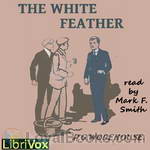 The White Feather
The White Feather
Sheen, a member of Seymour's House at Wrykyn School, flees from an unexpected assault by town boys. His colleagues wade into the fight with relish, acquiring bruises and sore heads, but in the fracas, Sheen is missed, and the story makes the rounds of Wrykyn that when blows were traded, Sheen "funked it." Honor in such institutions depends on reliably standing with your House. As punishment for his defection, Sheen is "cut" - treated as if he did not exist. In a later expedition into town, Sheen is set upon by the town bullies and finds that when retreat is no option, he can take their blows and fight against odds... | |
By: Eleanor H. Porter (1868-1920) | |
|---|---|
 Just David
Just David
A delightful story supporting the notion of finding beauty in all aspects of life, Just David follows a young boy, who slowly transforms the lives of those around him, as he teaches them to embrace the smaller things in life. The classic presents an encouraging tale to look beyond the horizon and not allow the world to dictate one’s action. The story begins with the introduction of a charismatic ten-year old boy David, who together with his father lives in the serene and secluded mountains... | |
 Pollyanna Grows Up
Pollyanna Grows Up
Pollyanna, now cured of her crippling spinal injury, and able to walk again, goes to live in Boston with Mrs. Carew, a heart-broken woman searching for her lost nephew. Aunt Polly goes abroad with Pollyanna’s new Uncle, Dr. Chilton. While in Boston, Pollyanna meets new friends and has several interesting adventures… A startling change in Aunt Polly’s and Pollyanna’s circumstances require Pollyanna to come up with a workable solution. Pollyanna’s solution brings all her new friends from Boston and her old friends in Beldingsville together. Pollyanna also discovers she has to make a choice. Who will win her heart? | |
 Oh, Money! Money!
Oh, Money! Money!
Mr. Stanley Fulton is worth millions, but he has no one to leave his money to except some unknown distant cousins. In order to find out how they would handle a fortune, he decides to give each of them $100,000 dollars during his life, and go – incognito - to live in their midst! Who will prove worthy to inherit his millions and will his deception be discovered?Eleanor H. Porter was an early 20th century author of children’s literature and novels. Her most well known book was “Pollyanna” and it’s sequel, “Pollyanna Grows Up”. | |
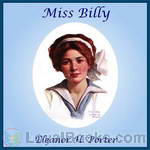 Miss Billy
Miss Billy
Mr. Neilson was determined to name his first child after his boyhood chum, William Henshaw. When the baby disappointed him by being a girl, he was consoled by naming her Billy. Miss Billy, now 18, orphaned and all alone in the world, takes her lawyer’s suggestion to ask her namesake to take her in. Only one little problem – Mr. Henshaw did not know of her existence, and then mistakenly thinks that Billy is a boy!Eleanor H. Porter was an early 20th century author of children’s literature and novels. Her most well known book was “Pollyanna” and it’s sequel, “Pollyanna Grows Up”. | |